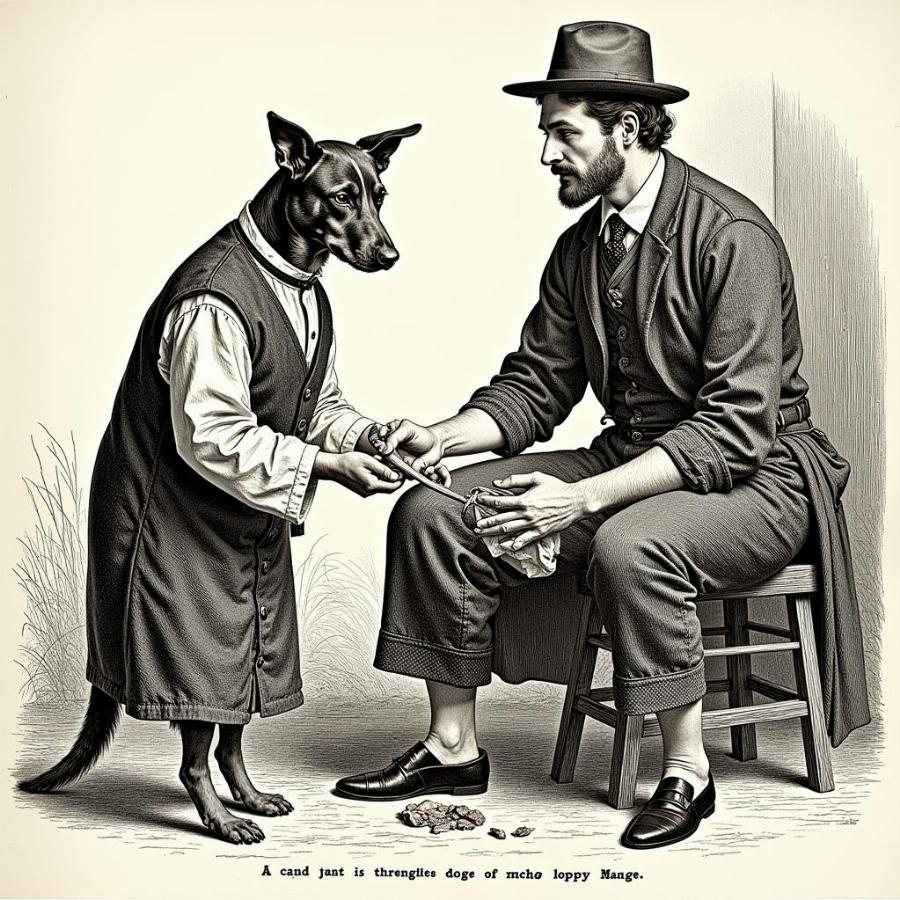Have you ever heard the phrase “the hair of the dog” and wondered about its meaning? It’s a common idiom, particularly when someone is talking about a hangover cure. But where did this saying originate, and what does it really mean? Let’s explore the intriguing history and modern-day interpretations of “the hair of the dog.”
Unraveling the Meaning
The phrase “the hair of the dog” is often used as shorthand for “the hair of the dog that bit you,” which refers to the age-old belief that a hangover can be cured or lessened by consuming more of the same alcoholic beverage that caused it. It’s a saying often met with amusement, skepticism, and sometimes even a touch of caution.
Tracing the Roots: A Look Back in Time
While the exact origins of this phrase remain a bit of a mystery, its roots can be traced back centuries. One theory points to ancient times when people believed in sympathetic magic. This involved the idea that treating an ailment with something that resembled it could bring about a cure. For example, a wound inflicted by a wolf might be treated with wolf fur.
 historical-depiction-of-dog-bite-treatment
historical-depiction-of-dog-bite-treatment
Another theory suggests that the phrase originated from the medieval practice of treating rabies with a potion that included hair from the infected dog. While this treatment was ineffective and potentially dangerous, it highlights the historical connection between dog hair and attempted remedies.
Separating Fact from Fiction: Does It Really Work?
The idea of “the hair of the dog” as a hangover cure is more of a myth than a medical recommendation. While having another alcoholic drink might temporarily mask some hangover symptoms by delaying their onset, it doesn’t address the underlying cause of a hangover: dehydration and the body’s processing of alcohol’s byproducts. In reality, consuming more alcohol can prolong the recovery process and potentially worsen the symptoms in the long run.
“While it might be tempting to reach for another drink when you’re feeling rough after a night out, it’s important to remember that this isn’t a sustainable solution,” says Dr. Emily Carter, a board-certified physician specializing in addiction medicine. “Hydrating with water, getting enough rest, and eating nourishing foods are much more effective ways to manage a hangover.”
The Hair of the Dog in Modern Language
Today, the phrase “the hair of the dog” is often used lightheartedly to describe any situation where someone tries to alleviate a problem by repeating the action that caused it, even if it’s not the most logical or effective solution. It’s a reminder that sometimes we cling to familiar remedies, even if they’re not the best course of action.
Beyond Hangovers: “Hair of the Dog” in Other Contexts
Interestingly, the concept of “the hair of the dog” extends beyond the realm of hangovers. In some cases, exposure to small doses of an allergen or irritant can actually help desensitize the body, a practice known as immunotherapy. While this might seem counterintuitive, it’s a medically recognized approach to managing allergies under the guidance of a healthcare professional.
Understanding the Idiom
The phrase “the hair of the dog” serves as a colorful reminder of the historical beliefs and practices surrounding dogs and remedies. While its application as a hangover cure might be more myth than fact, its presence in our language underscores the enduring fascination with folk remedies and the power of language to capture intriguing aspects of human behavior.
FAQs: Debunking Common Myths
1. Is it safe to use “the hair of the dog” to cure a hangover?
While a small amount of alcohol might temporarily mask hangover symptoms, it’s not a safe or effective cure. The best way to deal with a hangover is to hydrate, rest, and allow your body to recover.
2. Where can I find reliable information about hangover remedies?
Consult with your doctor or a qualified healthcare professional for safe and accurate advice on managing hangovers.
3. Are there any situations where “the hair of the dog” principle applies?
Yes, in the medical field, controlled exposure to allergens is used in immunotherapy to help desensitize individuals to specific allergens. However, this should always be done under the supervision of a medical professional.
Need More Tail-Wagging Insights?
For more fascinating facts about dogs, their health, and well-being, explore other informative articles on Beaut Dogs. We’re passionate about providing dog lovers with valuable resources to enhance the lives of their furry companions.
Beaut Dogs is your ultimate destination for all things dog-related, offering evidence-based information, expert advice, and a shared love for our canine companions. When you need tail-wagging support, reach out to us at [email protected]. Let Beaut Dogs help you navigate the wonderful world of dog ownership.